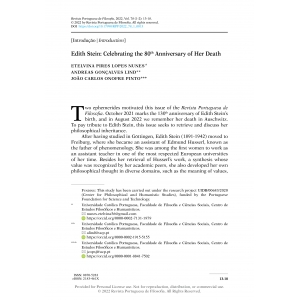| Abstract |
Two ephemerides motivated this issue of the Revista Portuguesa de Filosofia. October 2021 marks the 130th anniversary of Edith Stein’s birth, and in August 2022 we remember her death in Auschwitz. To pay tribute to Edith Stein, this issue seeks to retrieve and discuss her philosophical inheritance. After having studied in Göttingen, Edith Stein (1891-1942) moved to Freiburg, where she became an assistant of Edmund Husserl, known as the father of phenomenology. She was among the first women to work as an assistant teacher in one of the most respected European universities of her time. Besides her retrieval of Husserl’s work, a synthesis whose value was recognized by her academic peers, she also developed her own philosophical thought in diverse domains, such as the meaning of values, the role of women in society, the critique against totalitarianisms, among many other contributions. Edith Stein’s most relevant contribution in the field of phenomenology is, probably, an in-depth study of the notion of empathy (Einfühlung). She inherited this notion from her master, Husserl, who had, in his turn, inherited it from Theodor Lipps. By defending the thesis that, through empathy, it is possible for one to grasp subjective experiences of other persons, Edith Stein emerged as an original thinker in the philosophical milieu of her time. Her research around the notion of empathy brings out a thematization of the possibility of knowing what other persons, who are different from oneself and with whom one cohabits this world, might subjectively suffer. Edith Stein’s analysis sought to ensure this possibility even without the direct and personal experience that other persons feel. In addition to Husserl’s influence, Edith Stein’s philosophical work was profoundly affected by her conversion to Catholicism in 1922, and, from 1933, influenced by her Carmelite vocation, according to which she lived the last years of her life. In this respect, the interest that she showed in the thought of John Henry Newman and Thomas Aquinas, whose work Quaestiones Disputatae de Veritate she translated directly from Latin to German, stands out. Together with Husserls Phänomenologie und die Philosophie des hl. Thomas von Aquin (1929), Der Aufbau der menschlichen Person (1932), and Kreuzeswissenschaft (1941), and without forgetting the fundamental work Endliches und ewiges Sein, published posthumously in 1950, phenomenology, in the works of Edith Stein, developed into a fruitful dialogue with Thomism and Dark Night of the Soul mysticism. This issue starts by posthumously publishing a text by the Jesuit philosopher Xavier Tilliette, S.J. (1921-2018). We are honored to present “La doctrine des anges d’après Edith Stein” in this special issue, which celebrates the figure of the Christian martyr and other disciples of Husserl. The text is followed by a brief presentation by Cécile Rastoin. Tilliette argues that angelology remains current in the context of contemporary philosophy. And Edith Stein was able to express it by connecting classical angelology with the epistemological and anthropological questions of her time. Then, in this first part, we begin with a section dedicated to one of the most important notions in Edith Stein’s work: empathy. “Reflections around the Steinian notion of ‘Empathy’” contains five studies. Anna Maria Pezzella opens the section with “La passione per l’umano. Empatia e persona in Edith Stein,” an article in which the description of the phenomenon of empathy illustrates a person who comes out of himself and is therefore relational. Anna Maria Pezzella analyzes, in this context, what is proper to Edith Stein’s phenomenology, especially in relation to Husserl and Scheler. With the article “‘L’enigma dell’esistenza dell’altro’. Empatia e intersoggettività in Edith Stein,” Antonio Di Chiro draws out from Edith Stein’s philosophical itinerary a phenomenology that, instead of trying to access the consciousness of the other, describes the gesture of opening up to the other in his or her own situation within a shared world. The following article, entitled “Esencia y posibilidad de la intersubjetividad en Edith Stein y Max Scheler: Presentificación empática y percepción simpatética en la Fremderfahrung,” by Juan Velázquez González, proposes a fruitful complementarity, for the phenomenological description of the experience of alterity, between Edith Stein’s notion of empathy and Max Scheler’s concept of sympathy. This text is followed by “Ampliación trascendental de la empatía en Edith Stein: el tipo analógico,” by José Luís Caballero Bono, according to whom analogy is present in intersubjective experience in both Husserl and Stein. To conclude the first section, we include Rastko Jovanov’s article, entitled “Edith Stein’s Theory of Empathy in Applied Context.” This is an original practical application of Steinian theory to group psychotherapy. Entitled “Metaphysical and Phenomenological Issues,” the second section begins with the article “Edith Stein et le débat idéalisme versus réalisme en phénoménologie,” in which Juvenal Savian Filho argues that Edith Stein remains a phenomenologist throughout her entire work, i.e., faithful to Husserl’s approach, in refusing the classical opposition between idealism and realism. Next, in “Il complessivo ed ultimo pensiero di Edith Stein nell’orizzonte della Fenomenologia ultra-husserliana di Karl Jaspers,” Vincenzo Nuzzo shows the dependence on Husserl that Edith Stein exhibits even in the mystical-religious period of her work. Here follows the article “Entre Husserl y Tomás de Aquino. Aspectos metafísicos y epistemológicos del diálogo entre fenomenología y escolástica según Edith Stein,” in which Miriam Ramos Gómez shows how, in Edith Stein, scholastic philosophy meets the epistemological turn of Modernity. This relationship, between phenomenology and scholasticism, concerns the questions regarding the starting point of philosophy and how habit influences knowledge. By Michel Faye, the article “Edith Stein, entre Husserl et Thomas d’Aquin” follows the same direction, insofar as Edith Stein nuances Thomistic realism by staying true to Husserl’s essentialism. The result of this original synthesis is a kind of Augustinian Thomism. Entitled “Análisis de la noción de virtualidad en el contexto de una fenomenología de la conciencia de imagen: un estudio steiniano,” Maria Teresa Alvarez’s article goes further in the relationship between phenomenology and Thomism, showing Stein’s capacity to integrate Thomistic metaphysics in order to better clarify the notion of imagination and virtuality. Section III, entitled “Anthropology, Ethics, and Politics,” contains five articles. In “La questione del male nella filosofia di Edith Stein. Politica, etica e metafisica,” Angela Ales Bello addresses the question of evil in Steinian phenomenology, drawing out its metaphysical and political consequences. The article “A essência do eu: uma análise da constituição do si humano em Edith Stein e Hedwig Conrad-Martius” by Clio Tricarico, reveals the proximity between these two philosophical women in the conception of the human person in his or her pneumatic substance: the intentionality to the other is due to the spiritual and free nature of the person. In “Leib mehr als Körper. Bemerkungen zu Edith Steins Anthropologie,” Hanna-Barbara Gerl-Falkovitz deepens the distinction between Leib and Körper, to show how the notion of “living body” characterizes the experience that Edith Stein describes as freedom and self-consciousness.” Next, Joachim Feldes seeks to understand, in “Edith Steins Umgang mit Krisen – Phänomenologie, Gemeinschaft und Glaube,” in a very original way, what Steinian philosophy and life experience may say to our contemporary social crisis, linked to the Covid-19 pandemic. In the same direction, Eric De Rus revisits, in his article “Anthropologie et éducation selon Edith Stein : une approche de la destination surnaturelle de la personne humaine,” the intrinsic connection between phenomenology, metaphysics, and anthropology found in Stein’s work. Thus, insofar as human finitude is inevitably described in its openness to the eternal being, pedagogy that does not take this inner connection into account tends to reduce and destroy the human person. Finally, the fourth section, “Philosophy, Religion, and Mysticism,” begins with the article “El reposo y la seguridad en Dios. Bases para una fenomenología de la religión en Edith Stein,” in which Rubén Sánchez Muñoz elaborates, from the description of the experience of rest (Ruhens), a philosophy of religion from the work of Stein, who never detailed or made explicit such a philosophy. The following article is “El misterio de Edith Stein,” in which Walter Redmond shows how Stein combines philosophy with the mysticism of John of the Cross and Teresa of Avila, in the final period of her philosophical-spiritual production and in the concrete experience of her life. At the end, we present the article “Edith Stein : une philosophie juive ? De quelques résonnances philosophiques avec Martin Buber et Franz Rosenzweig,” in which Bénédicte Bouillot examines the Judaic concepts found in Steinian thought, arguing that her philosophy differs from the Thomistic models because it is inspired by some Jew philosophers. |
|---|









